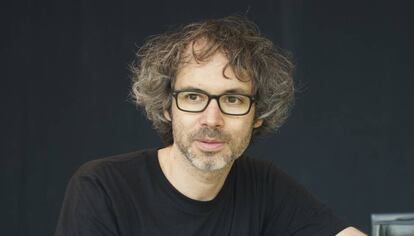James Rhodes on abuse law: “Spain has an opportunity to do something extraordinary”
The Madrid-based British pianist and writer, who was abused as a child, welcomes the government’s plans to abolish a statute of limitations on pedophilia offenses


In recent months, James Rhodes (London, 1975) has been the public face of the campaign calling on the Spanish government to pass a law that would protect children from violence. He knows what he is talking about. And he understands the hell that is being raped at the age of six. The Madrid-based pianist and writer, who was the victim of abuse perpetrated by a teacher, is calling for reforms to the laws covering pedophilia in Spain. On Monday he said he was “delighted” by the news that the Spanish deputy prime minister, Carmen Calvo, of the Socialist Party (PSOE), had met with the secretary of state at the Vatican to explain her government’s plans to abolish a statute of limitations for such crimes.
Question. How do you view the news that the government has told the Catholic Church that in Spain the abuse of minors will have no statute of limitations?
I hope that politicians can see that this is a win for the entire Congress, not just for the PSOE, but for all of Spain
Answer. I’m delighted. It’s wonderful. In August I met with [Spanish Prime Minister] Pedro Sánchez and he promised me that the [new law] would be a priority. People tell me that he wasn’t being sincere, that it’s just a typical political maneuver. But I really believed him. The prime minister looked me in the eyes and said that I had his word. It looks like they are really taking it seriously.
Q. What’s the most important thing about the announcement?
A. The most important thing about today is that they have said “enough” to the Church. They can’t hide [abuse cases]. When we’re talking about children, we all have to be on the same page. It’s essential. It doesn’t matter if the abuse was committed in the heart of the Church or at a football club. I’m really happy that Carmen Calvo has said this, although of course there’s still a long road ahead.
Q. What are you asking the political class for?
A. My only concern is that the rest of the parties want to delay the approval of the law to gain a political advantage. I can understand these maneuvers if we are talking about business, but not when we’re talking about children. I hope that they can see that this is a win for the entire Congress, not just for the PSOE, but for all of Spain. I trust that [Popular Party leader] Pablo Casado, [Ciudadanos leader] Albert Rivera and [Podemos leader] Pablo Iglesias support it, because they won’t be supporting Sánchez, but rather the children of Spain. I feel really proud of this country. People don’t want to talk about abuse cases, there’s a silence. The problem is that when you keep quiet, you end up with children being raped and the Church keeping quiet about it too and, with their silence, being complicit.
It’s vital that pedophiles know that they are not safe in Spain, that they are not going to be protected, that they are going to be tried, that they will go to prison
Q. What other issues do you consider essential, and that should be covered by the law?
A. Right now the government is working on a draft. And it has a text that was written by experts that includes, for example, improvements to the legal system, one that adapts to the victims, so that children only have to make a statement once. And better training in schools. It’s really important to give more information and more education. It’s extremely important. The statute of limitations is also fundamental. And it’s vital that pedophiles know that they are not safe in Spain, that they are not going to be protected, that they are going to be tried, that they will go to prison and they will serve their sentences. This is what the new law will bring with it. When this legislation is approved, Spain will be the number-one country in the world in terms of safety for children. This is something that we should all feel very proud about.
Q. How do people get over such abuse?
I respect the Catholic Church. What I can’t respect is for people to use their power to cover up abuse and that the Church be an accomplice
A. It’s very hard. It takes a whole lifetime to get over it. This law also means an improvement because it entails children being treated with respect. Organizations such as Save the Children have made advances in this respect, with awareness campaigns and support for the victims. The important thing is that children be treated with respect. And that organizations such as the Catholic Church know that they are not untouchable, that justice will be done. Because for many years it has not been held to account. It has hidden [cases], it has halted police investigations. This has to stop. I respect the Catholic Church. What I can’t respect is for people to use their power [to cover up abuse] and that the Church be an accomplice.
Q. What advice would you give the victims?
A. I’m not a doctor or a therapist. What helped me was seeking professional help and talking. It takes a long time and you have to be careful who you talk to about this. It could be a teacher or a therapist.
Q. What do you say to victims who get in touch with you?
A. I have received a lot of messages. Hundreds. Many tell me that they can’t believe the new law will become reality. A lot of them say that the politicians in Spain are saying that they are going to do something but then they won’t do anything. When [the law is approved], if that happens, people will be able to start to trust that the government does take action. If children could vote, we wouldn’t be having this conversation. But they can’t, nor do they spend money. And that leads to a lack of respect for children, not just here, but in every country. Spain has a small window of opportunity to do something extraordinary. [If the law is passed], it would be a point of reference, an example for the rest of the world. It would make Spain the number one country in the world when it comes to safeguarding children.
English version by Simon Hunter.
Tu suscripción se está usando en otro dispositivo
¿Quieres añadir otro usuario a tu suscripción?
Si continúas leyendo en este dispositivo, no se podrá leer en el otro.
FlechaTu suscripción se está usando en otro dispositivo y solo puedes acceder a EL PAÍS desde un dispositivo a la vez.
Si quieres compartir tu cuenta, cambia tu suscripción a la modalidad Premium, así podrás añadir otro usuario. Cada uno accederá con su propia cuenta de email, lo que os permitirá personalizar vuestra experiencia en EL PAÍS.
¿Tienes una suscripción de empresa? Accede aquí para contratar más cuentas.
En el caso de no saber quién está usando tu cuenta, te recomendamos cambiar tu contraseña aquí.
Si decides continuar compartiendo tu cuenta, este mensaje se mostrará en tu dispositivo y en el de la otra persona que está usando tu cuenta de forma indefinida, afectando a tu experiencia de lectura. Puedes consultar aquí los términos y condiciones de la suscripción digital.








































